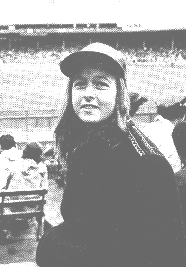Page 43
[Begin Tape 1, Side A]
Ritchie: Okay, I think we're ready to begin.
Ludtke: Okay, go ahead. All of this is going to have to dredge up many things from my memory that hasn't been focused on this in years, so you're going to know more about it than I am.
Ritchie: Well, last time, which is almost ten months ago, that we met, we talked about the events leading up to the lawsuit, the World Series in 1977, and I thought maybe you could just briefly summarize those events to start out today.
Ludtke: During the World Series in '77, which is when the access issue came up. The events of that World Series really began the day before the World Series began, during a sort of practice day, where the teams both came out and just did batting practice and fielding practice. I just went up that afternoon to the stadium, and on my way out to the field, ran into Tommy Lasorda, who I had met when I had been working on a book with Roger Kahn the year before, so there was a remembrance between the two of us.
We got talking, and I simply mentioned to him the possibility of what would it be like if I needed to come into the locker room during any time in the Series, would that be possible? I think at that stageóI know at that stageóBilly Martin, who was the manager of the Yankees, was starting to let me in the back door of the Yankees clubhouse, so I felt that there I could at least figure that I could get some access if I needed it, so I was kind of asking Lasorda for his view.
He was walking at the time with Tommy John, who was a pitcher for the L.A. Dodgers, but also happened to be the player rep [representative] for the team, so I think he felt, "This is one I can toss right over to the player rep," which he did. He introduced me to Tommy John, and I just sort of went through introducing myself, and the question posed to him was whether I could have access and what the players would think about it. He sort of volunteered himself to go back and ask the players what they'd think about it, and let me know before the game the following day what they had said. We kind of both assumed that if the players thought it was okay, then it would be okay.
The irony is, as I think you've seen in the scrapbook, I, of course, had a pass to the World Series which enabled me to go into the locker room, so I was credentialed for it, but because it was evident that I was a woman, that credential was thus meaningless as soon as I was near the door.
Ritchie: You mention the word "credential," and I wonder how one obtains credentials. If I were go to and say I was interested in writing an article or a book, could I get credentials?
Ludtke: Yes, you apply through, I believe at the World Series it falls under the bailiwick of the Baseball Writers Association handles it, but during the year, you'd apply to the teams, wherever you were going to go to cover a game. You'd call up the public relations person and say, "I want

